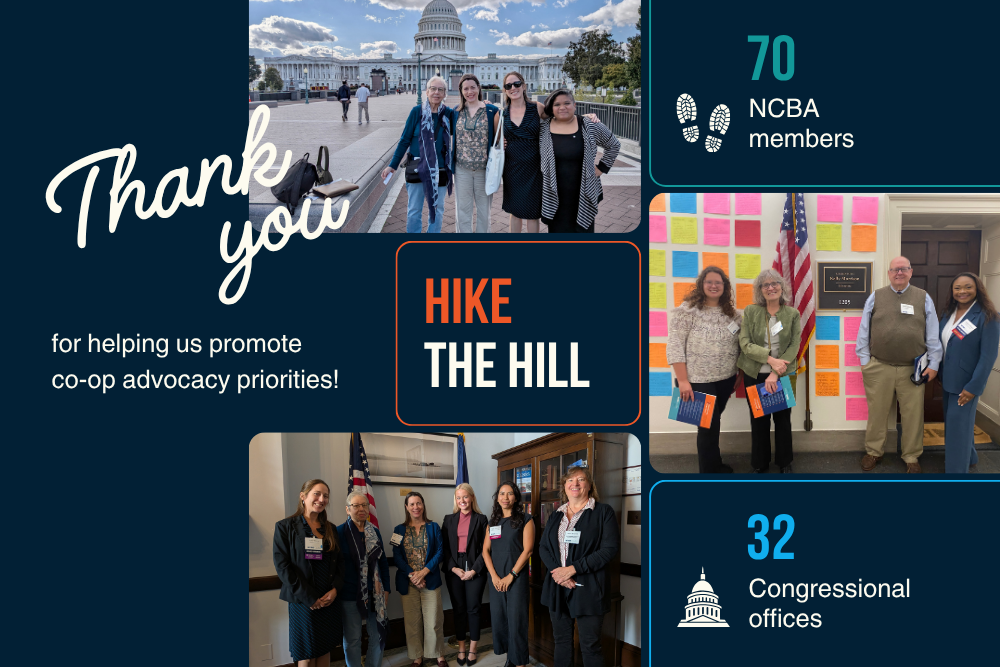
On October 8, NCBA CLUSA members gathered in Washington, DC for the 2025 Cooperative IMPACT Conference. On Wednesday afternoon, amid the ongoing federal shutdown, 70 cooperators made their way to Capitol Hill for NCBA CLUSA’s third annual Hike the Hill event. This event is an opportunity for cooperators to advocate for co-op legislative priorities with Members of Congress on both the House and Senate side.
Cooperators representing all sectors of the co-op economy—including rural electric, housing, agricultural, credit unions and cooperative development centers—met with legislative staff in 32 different Congressional offices.
Each of the Congressional Members we visited sits on committees that are key to cooperative economic growth and development, including the House and Senate Agriculture, Small Business, Appropriations, Foreign Relations and Financial Services Committees.
After a detailed briefing beforehand, cooperators traveled to the Hill to engage in the dynamic advocacy, storytelling and educational discussions that are critical to advancing co-op legislative priorities on Capitol Hill.
Co-op members discussed several pressing issues, outlined below.
Preserving the Cooperative Tax Status
- Co-op businesses are inherently both locally owned and participatory, embodying a direct connection between member needs and the services provided. Because of this, cooperatives contribute directly to community vitality and stability, modeling equitable and inclusive economic practices.
- Fair tax treatment of cooperative entities is an essential aspect of the cooperative model. Due to the unique community-first practices of co-op businesses, it is vitally important for Congress to preserve the cooperative tax status.
Increasing Affordable Housing through Cooperatives
- Limited Equity Cooperatives (LECs) and Resident Owned Communities (ROCs) are stable and effective forms of Shared Equity Housing that provide permanently affordable housing, ownership and democratic control, particularly for limited-income residents.
- To expand permanently affordable housing cooperatives, Congress should revitalize the Department of Housing and Urban Development (HUD) Section 213. To support all kinds of housing cooperatives, HUD should appoint a Special Assistant for Cooperative Housing as directed in the 1955 National Housing Act to provide the technical assistance and capacity for stakeholders in affordable housing cooperatives.
Leveling the Playing Field for Co-ops by Fully Implementing the Main Street Employee Ownership Act
- As a generation of baby boomer small business owners nears retirement, half of the nation’s small businesses are at risk of buyout or closure.
- These businesses could convert to worker or consumer-owned cooperatives—a model that promotes local ownership and preserves the small businesses at the heart of local economies.
- To assist with conversion to cooperatives, the U.S. Small Business Administration (SBA) should fully implement the spirit of the 2018 Main Street Employee Ownership Act by waiving the personal loan guarantee requirement for cooperatives under SBA’s 7(a)-loan program.
Reauthorizing the 2025 Farm Bill
- Congress has the opportunity to support cooperatives and ensure they continue to create jobs, preserve businesses and promote local economic growth by swiftly reauthorizing the 2025 Farm Bill and including the following priorities.
- Modernizing the Rural Cooperative Development Grant Program (RCDG). As the only federal program dedicated to advancing domestic cooperative businesses, the Rural Cooperative Development Grant (RCDG) program helps create and sustain vibrant rural communities.
- Maintaining affordable energy infrastructure upgrades for residents through improvements to the Rural Energy Savings Program.
- Robust investment in rural communities to support capacity building and locally-led economic development.
- Supporting food co-ops and local producers through a strong Nutrition Title.
- Bridging the digital divide by expanding broadband access through rural electric cooperatives.
Grassroots advocacy is a critical component of the legislative progress, which is especially true as advocates seek to properly identify and fulfill the diverse needs of the cooperative community. This year, NCBA welcomed a number of member-owner professionals who truly embody the cooperative spirit both in their communities and at Capitol Hill. Hike the Hill allowed congressional offices to hear directly from their co-op constituents about the challenges cooperatives face, the benefits cooperatives bring to their communities, and how legislators can work with NCBA CLUSA to craft policy that promotes the development of cooperatives for the benefit of all Americans.
NCBA CLUSA’s advocacy team encourages members and co-ops across the country to engage with the members of Congress, state legislators and local policymakers. Inviting elected officials to visit your co-op is a great way to show them firsthand how cooperatives impact their district’s economies. Members can learn more about NCBA CLUSA’s Advocacy Priorities here or reach out to advocacy@ncba.coop with any questions about how you can become a co-op advocate at the federal, state or local policy level.


